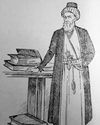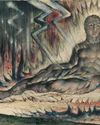試す 金 - 無料
Moral Education in Confucianism
Philosophy Now
|December 2022 / January 2023
Plakshi Jain compares reflection’ and learning’ as means of becoming good.
-

"If it receives its proper nourishment, there is nothing which will not grow.
If it loses its proper nourishment, there is nothing which will not decay away." - Mengzi (trans. James Legge)
"Blunt metal must await honing and grinding, only then does it become sharp. Since people's nature is bad, they must await teachers and proper models, only then do they become correct." - Xunzi (trans. Eric Hutton)
This article attempts to compare the views of two significant Chinese philosophers, Mengzi and Xunzi, on the importance of moral education.
Both were followers of Kongzi (551-479 BCE) better known in the West as Confucius. His 'Way' has been popularized as Confucianism for hundreds of years via the Analects, a text written by his disciples to put forth his teachings. The Way of Kongzi advocates many things for society, but for this article we will focus on the cultivation of ethics.
Kongzi believed society can be improved only when people in authority are virtuous, and he developed educational techniques to inculcate kindness and wisdom as well as knowledge.
Having said that, his statement, "If you learn without thinking about what you have learned, you will be lost. If you think without learning, however, you will fall into danger" has generated a lot of debate among Confucian scholars on how much emphasis must be given to thinking and learning respectively. This is where a comparison of the views of his disciples Mengzi and Xunzi comes in.
Growing With Mengzi, Grinding With Xunzi
Mengzi's use of the word 'grow' quoted at the start to connote the process of education, and of 'nourishment' to connote its importance, in contrast to Xunzi's words 'grinding' and 'correct', pinpoint the key difference in Mengzi's and Xunzi's philosophies of ethical cultivation.
このストーリーは、Philosophy Now の December 2022 / January 2023 版からのものです。
Magzter GOLD を購読すると、厳選された何千ものプレミアム記事や、10,000 以上の雑誌や新聞にアクセスできます。
すでに購読者ですか? サインイン
Philosophy Now からのその他のストーリー

Philosophy Now
Bilbo Theorizes About Wellbeing
Eric Comerford overhears Bilbo and Gandalf discussing happiness.
9 mins
December 2025 / January 2026

Philosophy Now
What Women?
Marcia Yudkin remembers almost choking at Cornell
11 mins
December 2025 / January 2026

Philosophy Now
Islamic Philosophers On Tyranny
Amir Ali Maleki looks at tyranny from an Islamic perspective.
4 mins
December 2025 / January 2026

Philosophy Now
Peter Singer
The controversial Australian philosopher defends the right to choose to die on utilitarian grounds
5 mins
December 2025 / January 2026

Philosophy Now
Another Conversation with Martin Heidegger?
Raymond Tallis talks about communication problems.
7 mins
December 2025 / January 2026

Philosophy Now
Letters
When inspiration strikes, don't bottle it up. Email me at rick.lewis@philosophynow.org Keep them short and keep them coming!
17 mins
December 2025 / January 2026

Philosophy Now
The Philosophy of William Blake
Mark Vernon looks at the imaginative thinking of an imaginative artist.
9 mins
December 2025 / January 2026

Philosophy Now
Philosophical Haiku
Peering through life’s lens God in nature is deduced: The joy of being.
1 mins
December 2025 / January 2026

Philosophy Now
Philosophy Shorts
More songs about Buildings and Food' was the title of a 1978 album by the rock band Talking Heads. It was about all the things rock stars normally don't sing about. Pop songs are usually about variations on the theme of love; tracks like Rose Royce's 1976 hit 'Car Wash' are the exception. Philosophers, likewise, tend to have a narrow focus on epistemology, metaphysics and trifles like the meaning of life. But occasionally great minds stray from their turf and write about other matters, for example buildings (Martin Heidegger), food (Hobbes), tomato juice (Robert Nozick), and the weather (Lucretius and Aristotle). This series of Shorts is about these unfamiliar themes; about the things philosophers also write about.
2 mins
December 2025 / January 2026

Philosophy Now
Hedonic Treadmills in the Vale of Tears
Michael Gracey looks at how philosophers have pursued happiness.
8 mins
December 2025 / January 2026
Translate
Change font size
